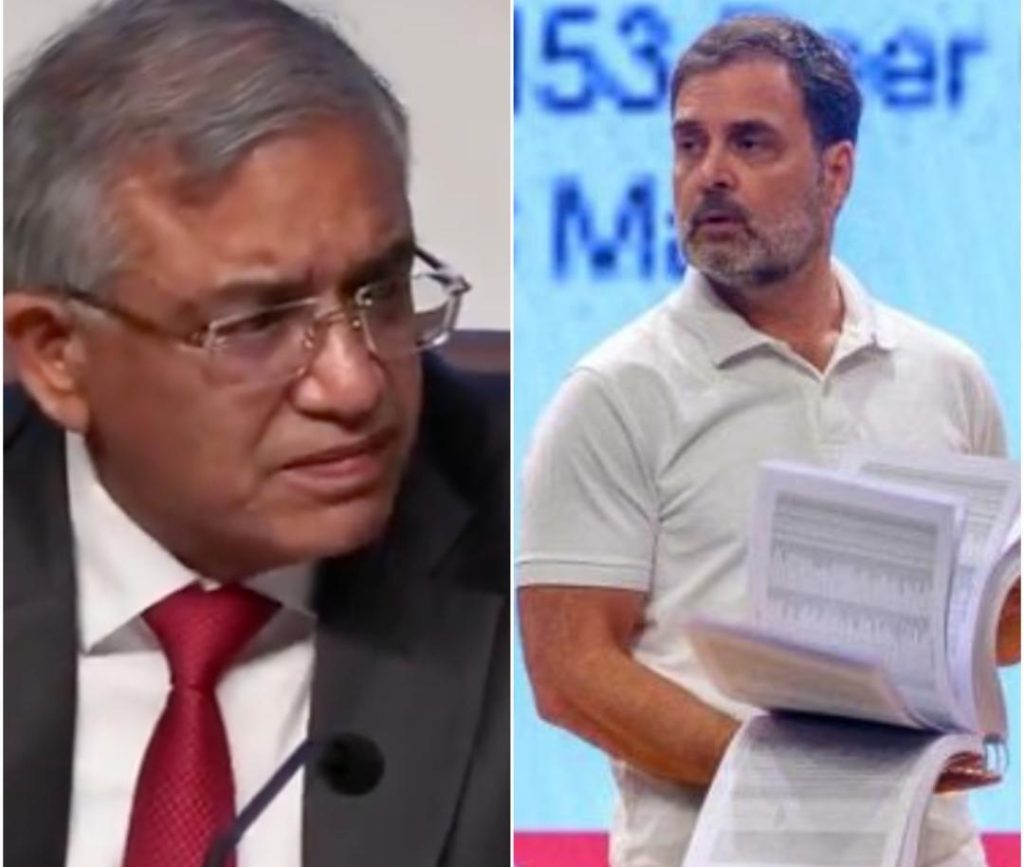
Vote Chori’ Phrase an Insult; Should We Share CCTV Footage of Mothers & Sisters Voting?: EC
The recent election season in India has seen a plethora of controversies and heated debates. One such issue that has gained significant attention is the usage of the term “vote chori” (vote theft) by Congress leader Rahul Gandhi, claiming that elections are rigged. The Election Commission of India (EC) has come out strongly against this phrase, terming it an insult to the Constitution. The EC has also raised concerns about releasing surveillance footage from polling booths, citing voter privacy concerns.
The “vote chori” phrase has been used by Rahul Gandhi on several occasions, claiming that the ruling BJP is manipulating the electoral process to achieve victory. However, the EC has taken umbrage with this term, with Chief Election Commissioner Gyanesh Kumar calling it an insult to the Constitution. Kumar emphasized that the EC is committed to ensuring free and fair elections, and the usage of such phrases can undermine the credibility of the electoral process.
The EC’s concerns are not unfounded. The term “vote chori” has the potential to create a sense of mistrust and cynicism among voters, leading to a decline in participation in the electoral process. Moreover, it can also be used to intimidate and harass voters, further eroding the already fragile trust in the system.
Furthermore, the EC has also raised concerns about releasing surveillance footage from polling booths. On demand from some quarters to share CCTV footage of voters, including mothers and sisters, Kumar asked, “Should the Election Commission share the CCTV videos of any voter, including their mothers, daughters-in-law?” This question highlights the sensitive nature of voter privacy and the potential risks of releasing such footage.
The EC is right to emphasize the importance of protecting voter privacy. Voters have the right to cast their ballots without fear of intimidation or harassment. Releasing surveillance footage of voters, including their mothers and sisters, can compromise this right and create a sense of vulnerability among voters.
In addition, releasing such footage can also be used to create a sense of mistrust and suspicion among voters. It can be used to imply that voters are guilty until proven innocent, rather than the other way around. This can undermine the fundamental principles of democracy, where voters are assumed to be innocent until proven guilty.
The EC’s emphasis on protecting voter privacy is also critical in the context of India’s diverse and complex electoral system. With millions of voters participating in the electoral process, the risk of false or misleading information spreading is high. Releasing surveillance footage of voters can create a sense of chaos and confusion, making it difficult for voters to make informed decisions.
Instead of calling for the release of surveillance footage, political parties and leaders should focus on promoting a culture of transparency and accountability in the electoral process. This can be achieved by ensuring that the electoral rolls are accurate and up-to-date, that voting machines are functioning properly, and that voters have access to accurate information about the electoral process.
In conclusion, the EC’s criticism of the “vote chori” phrase is well-founded. The term has the potential to undermine the credibility of the electoral process and create a sense of mistrust among voters. Furthermore, releasing surveillance footage of voters, including their mothers and sisters, can compromise voter privacy and create a sense of vulnerability among voters.
Political parties and leaders should focus on promoting a culture of transparency and accountability in the electoral process, rather than resorting to inflammatory rhetoric and demands for the release of sensitive information. By doing so, we can ensure that the electoral process remains free, fair, and transparent, and that voters can exercise their right to vote with confidence and dignity.
Source:






